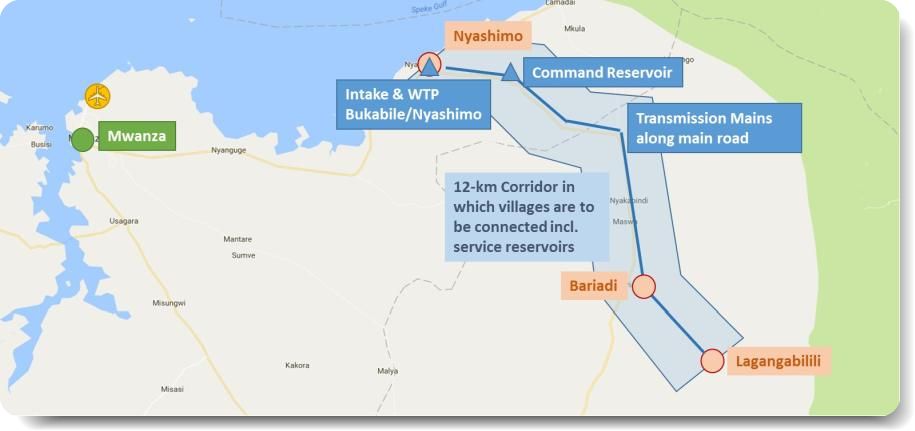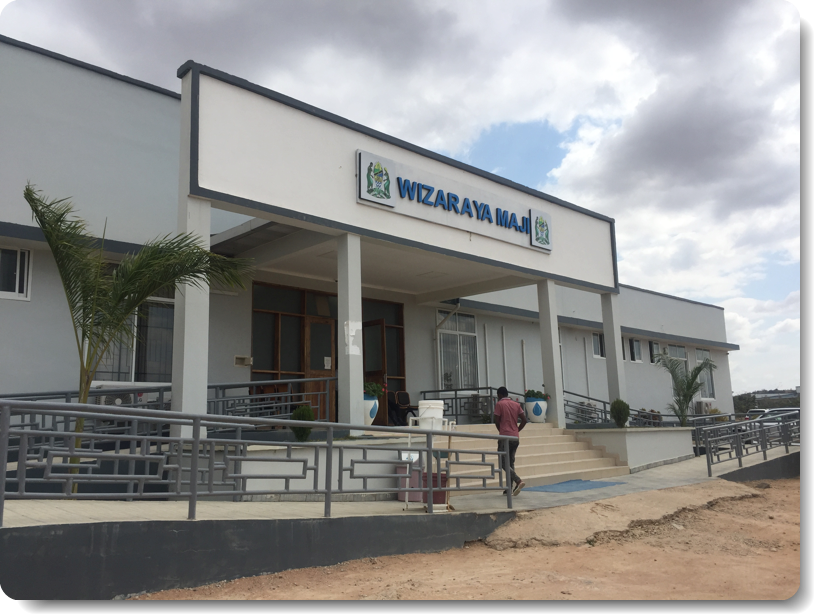Component 1: Enabling Environment established through institutional coherence and capacities
Output 1.1 focuses on a paradigm shift at the national level by (i) establishing a Steering Committee to review lessons learned and propose cross-sectoral climate adaptation rules and regulations and (ii) strengthening inter-governmental cooperation and decision making through knowledge sharing on adaptation project best-practices.
Output 1.2 focuses on the sub-national level and the community-driven participatory process in cross-sectoral development planning, implementation and operations for activities in rural areas. This implies enhancing the capacities of community-based user associations for local level adaptation planning (rural water, sanitation and agriculture), facilitating the development of community adaptation plans and increasing agricultural climate awareness and capacities through implementation of Farmer Field Schools.
Component 2: Climate resilient water supply for sustained access to water
The water supply component will focus on only three of the five districts of the Simiyu Region, namely Busega, Bariadi and Itilima. It is foreseen that the population shall be served by a bulk water supply system from Lake Victoria to Lagangabilili (in phase 1; possibly to be extended at a later stage). This water supply system shall provide three urban settlements as well as 50% of the rural population living in a 12-km wide corridor from the pipeline (each side) with drinking water in the above mentioned three districts.
The investments include the following:
Output 2.1: bulk water supply - intake, feeder to Water Treatment Plant (WTP), WTP, feeder to command reservoir, command reservoir, gravity transmission pipeline and primary reservoirs to provide towns and villages.
Output 2.2: urban water supply - densification of urban networks, extensions, new construction of water supply networks in three towns.
Output 2.3: rural water supply - 24-km wide corridor (12-km each side of the transmission mains) of villages to be connected to the pipeline, connection from the pipe- line by service reservoirs. Planned coverage: 50%.

All investments foreseen under this component will be accompanied by intensive capacity building measures including establishment of water utilities, support for operation and maintenance as well as awareness raising campaigns.
Output 2.2 concerns urban water supply. Three towns (Nyashimo, Bariadi and Lagangabilili) will be served with drinking water. Currently, only Bariadi (67,000 inh) has a centralised water supply network of 130 km. Nyashimo (16,000 inh) has a water supply system of only 3.5 km. In Lagangabilili (12,000 inh), the Government of Tanzania is currently investing in an urgent relief system which should then be integrated into the upcoming system (if possible). In total, around 166 km (18 km Nyashimo, 140 km Bariadi, 8 km Lagangabilili) of water supply network including house connection pipelines are expected to be constructed, around 70 public taps and 6,000 private taps are to be installed in all three towns.
Output 2.3 concerns rural water supply. Rural water supply measures aim at providing 50% of the rural population living in a 12km wide corridor from the pipeline (each side) with clean drinking water. The feasibility study identified that around 495 km of pipelines are to be laid and 700 public taps to serve the rural population; however, this number lacks substantial background data. Rural settlements along the pipeline are supplied through secondary reservoirs and distribution networks. Remote rural villages can be served by tanker filling stations at these reservoirs. A concept on the selection of eligible villages to be supplied needs to be established.
Component 3: Improved community resilience through application of climate- adapted agriculture practices
Climate-smart agriculture measures will be carried out in the whole Simiyu Region (all five districts). An open demand driven, and participatory approach will be applied to strengthen local farmer’s capacities to adapt to the changing environment. Vulnerable and poor people as well as women are to be involved in decision making. Measures up to EUR 350,000 are being financed through a disposition fund; measures above that ceiling will be financed through direct disbursement to contractors.
Planned investments under output 3.1 include:
- Construction of small dams for water harvesting (around 20 dams of different sizes).
- Small-scale irrigation system, e.g., drip irrigation (for around 1,700 ha).
Planned investments under output 3.2 include:
- Support to the provision of climate resilient seeds (around EUR 100,000, 1,500 ha);
- Expansion of forests (3,700 ha) and areas under Ngitili management (10,000 ha).
Component 4: Reduced vulnerability through climate adapted and integrated sanitation and hygiene practices
Component 4 focuses on the same geographic areas (Busega, Bariadi and Itilima) as the water supply investments with investments in improved latrines and an organized treatment of faecal sludge.
Planned investments under output 4.1 include:
- Construction of two to three effective fecal sludge treatment systems with a total capacity of around 38,000 m³.
- Procurement of two fecal sludge exhauster trucks.
Planned investments under output 4.2 include:
- Construction of 30 public gender sensitive sanitation solutions (including public toilets at markets, bus stations, schools etc.).
- Facilitation of access to materials for improved/water-saving household latrines (at least 1,000 concrete blocks and ventilation pipes).
Planned measures under output 4.3, including targeted knowledge and awareness campaigns to promote behavioural change and integration of improved health and hygiene practices, support the investments under outputs 4.1 and 4.2 and should reach at least 300,000 beneficiaries.
Component 5: Project Management
Under component 5, support to the Government of Tanzania at the national and local levels is foreseen.
Output 5.1: Support to MoW and the Steering Committee in steering, monitoring, coordinating and managing the project (including capacity building). Activities concerned are establishing the Steering Committee and strengthening inter-governmental cooperation and decision making through knowledge sharing on adaptation project best-practices.
Output 5.2: Support to the Project Management Unit (PMU) that will be established at the regional level to coordinate and implement the community-driven approach (e.g. rural sanitation, public toilets, climate-smart agricultural practices).











